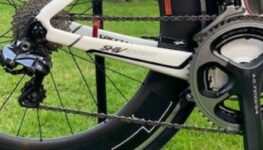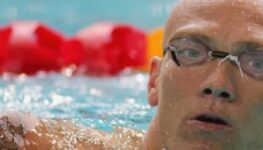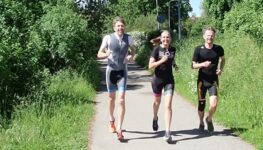Recovery
Recovery podcast with Dr Mike Israetel – the interview starts at 5mins.
Although this episode is specifically talking about recovery from a strength and power training angle, the principles and underlying message applies to endurance training too.
To summarise the episode:
Everyone should be prioritising recovery as part of their normal training so you a) adapt to the training load, to get faster and stronger, and b) massively reduce the need to ever recover from injury!
Don’t make the common mistake and wait until you reach an injured state to focus on recovery. It’s too late then!
As we preach, consistency over the long term is better than a short term (attempt) to peak. Consistency over years, not just weeks and months is the ONLY way to improve sustainably.
Beware of social media hype and misinformation. Many athletes (the key influencers to you as a fellow-athlete) do over-train, even ´promoting´ over-training but they will, and do eventually burnout. They lie to sell products (as an ambassador) or lie by posting outdated or one-off event material to look good and strong all year around.
Four main causes of injury:
- Poor movements – attempting to swim like swimmers, cycle like cyclists and run like runners with an older body
- Bad luck – accidents
- Too fit/strong – when you are at the peak of your training block you are more likely to injure yourself. You are able to push harder and move faster, increasing the risk of injury. It does happen, even if you have ideal preparation and movements (and could be classed as being a self-inflicted accident) so know when to ease back to reduce the risk.
- Chronic fatigue from under recovering!
Recovery is essential every day, week after week and month after month in order to adapt and progress (without injury). This is why we make you all individual plans with the layouts specific to you with weeks of building and de-loading as part of a 15-16week training block.
Not only do you need to be training smart, you need to manage the other areas in your life to optimise recovery: nutrition, sleep, work hours, etc.
Recovery = return to normal performance
If you can’t return to normal, how can you progress to higher performance?!
Training is often NOT the problem. It is other areas of life that overloads the stress. Sleep, relationships, work, fuelling, etc.
Training requires recovery on many levels. It’s not a simple process, but it is “relatively” simple if you rest between sessions, sleep and get your nutrition in place, and remember to factor in the other activities you do such as commute rides, yoga, etc, and general life stresses!
Some chronic fatigue related problems only present themselves when it’s too late! Ligaments and tendon strains/ruptured especially are often not noticed until the give out, and they are also notoriously hard to rehab!
Hierarchies of training (no shortcuts!):
- Stay within your limits
Mike terms it MRV (maximum recoverable volume), the most amount of volume you can do in a period of time and recover from. Joel Filliol calls it the “minimum effective dose”. If you consistently exceed your limit, you cannot recover from it. The MRV is dynamic, to a small degree (positively and negatively!)
Triathlon had three disciplines to balance, this make it easier to manage, but also trickier. Too much intensity from the bike and run too close together can tip your body over the edge. Swimming is different being upper body focused.
Newer athletes (young or old) need to do more lower intensity work to build their MRV.
- Passive recovery
Sleep! It is irreplaceable! Consistently good sleep is the key, not averaged over time. You know when you are under-slept; listen to your body and it’s signs.
- Relaxation
Strive for a state of calm – limit stimulants and your hype! Think and act slow.
- Stress management
Linked to the above – learn to accept some life stresses, look for processes to calm your mind and body. All stress, from all sources (mental and physical) affects the body in the same way and this will negatively impact training.
- Nutrition
Eat plenty of calories (to fuel your training and life), eat carbs (THIS PODCAST IS SPECIFIC TO WEIGHT AND POWER LIFTERS, not endurance athletes), plenty of protein and ample fats to keep (good) hormones elevated (you need fats!).
Eat regularly. Eat “healthy” foods – we all know what these are and aren’t (real foods, not processed)
Chronic under eating, eating “crap” or trying an alternative diet approach while in high dose training WILL be detrimental to performance.
- Active recovery
Active recovery is not EXTRA training! “Everyone always wants to do extra”. It’s the recovery from training through specifically prescribed sessions each week, de-load weeks, general preparation weeks (between training blocks), opting to have light sessions if needed (YOU choose to modify a session to fit your daily energy/stress levels).
Lighter sessions help you recover FASTER from harder sessions, this is why we programme your plans the way we do and why your watches say you need “x” hours recovery after a hard session, but you train again within that period (easier) then the figure is halved.
De-loading doesn’t mean removal of all intensity, it’s a reduction of the volume; less time at intensity (less STOMPS for example)
- Active rest
Sometimes you may need active rest phases (general prep) where you stop the sport altogether for a week-2weeks. Still doing activities, but not necessarily linked to your main sport. Good for body and mind.
If you aren’t careful, your hobby (triathlon) may take everything from you if you become obsessed and forget its place in life!
You will lose small amounts of fitness, but it is minimal and out-weighed by the revitalisation effects of taking time away from structured training. “Training for the soul” – as Dmitry Klokov would say! Check his history and videos – very strong, very technical (but not “perfect”), but needs time off too!
Stay focus on your goals, work and grind for them, but plan some downtime too! You cannot be at your peak all the time (not as portrayed in social media).
De-load / active recover with just as much focus on sleep, food, etc, or completely miss the point of the phase in training!
- Therapeutic
Social interactions, friends, family, sports psychology etc.
- Supplementation
Compression, thermal (ice / heat), etc. Borrowed from injury recovery, use to try to help recover from training, but noting that the recovery effects are more to do with simply relaxing whilst undergoing the intervention!
Food supplements might be beneficial, but not if you are already getting enough of the whole foods in daily, sleeping well, factoring in life stress, etc.
Mike suggests that if you have all other recovery processes in line, you could try using them when you really need to try (TRY) and find a boost – in the final stages of a training block.
Simple whey protein (not the “fancy” stuff with all sorts of additives) is the most useful, for an easy and quick post session refuel – it is not expensive this way either.
Conclusion
Another useful and simple to understand resource to confirm that you NEED to prioritise your recovery from training and life!
If you want to get better and benefit from your training, you need to recover!



